Sir Hercules George Robert Robinson, First Baron Rosemead, was born on 19 December 1824 at Rosemead, County Westmeath, Ireland. Educated at Sandhurst, he joined the 87th Regiment (Royal Irish Fusiliers) as second lieutenant at the age of 19. He was quickly promoted to first lieutenant, but the enforced sale of the family estates forced him to resign in 1864, the year he married Nea D'Amour. Until 1849 he supervised relief works for Irish famine victims. He continued to work in public office, and in 1852 was chief commissioner inquiring into Irish fairs and markets. Two years later he became president of Montserrat, and in 1855 accepted the first of many governing posts as lieutenant-governor of St Kitts (St Christopher). He was knighted at the age of 35 and in the same year became governor of Hong Kong. As governor he negotiated the annexation of Kowloon.
Robinson's career continued to flourish. In 1865-72 he was governor of Ceylon, at the end of which he was made Knight Commander (of the Order) of St Michael and St George. He showed himself to be a hard worker and a just and efficient administrator. His shyness in formal engagements contrasted with the social enthusiasm shown by his wife. In February 1872 Robinson was appointed governor of New South Wales, and arrived in Sydney on 3 June that year.
Robinson was not content to be a mere figurehead, and his active role in politics saw him play a valuable role in the development of responsible government in New South Wales. His concise and perceptive dispatches to the Colonial Office included analyses of the government and the problems of its structure. However, his attitude to colonial institutions was essentially paternalistic, more suited to a crown colony than a semi-independent, albeit fledgling, democracy. He tended to antagonize parliament, but he was publicly popular, in part because he had developed a flair for public speaking in which he extolled popular themes such as manly sports. He was particularly interested in cricket and horse racing, and did much to improve the administration of the latter. When his daughter married in 1879 she wore her father's racing colours, to the pleasure of the large crowd that had gathered.
Robinson left New South Wales in the year of his daughter's wedding to become governor of New Zealand. The following year he became governor of Cape Colony and High Commissoner of South Africa. In South Africa he had to deal with the difficulties of the conficts between the Boers, British and indigenous people. Considered comparatively successful, he was given a privy councillorship in 1883. He left the Cape in 1889 to become a director of the London and Westminster Bank. In 1891 he was created a baronet, and in 1895, at the age of 71, was recalled to South Africa. On leave the following year he was made Baron Rosemead of Rosemead, Ireland, and of Tafelberg in South Africa. Back at the Cape he faced the challenging task of reconciling the Boers and the British, but was forced to retire through ill health. He returned to London, where he died on 28 October 1897. He was survived by a son and three daughters.
References:
Australian Dictionary of Biography website http://adbonline.anu.edu.au/adbonline.htm
More Information
-
Keywords
-
Localities
-
Authors
-
Article types


